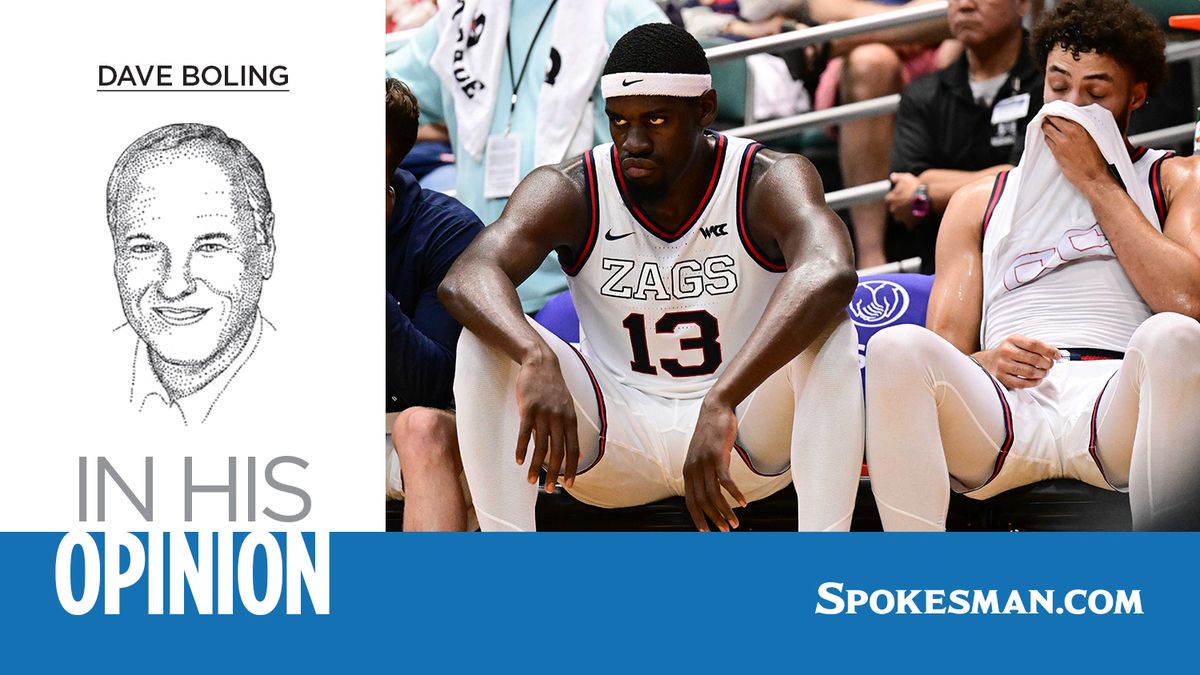Dave Boling: Shooting and ball-handling will turn around. For now, Gonzaga can really improve by finding its leader.

HONOLULU – Something to keep in mind if you’re interested in rationalizing Gonzaga’s 73-63 loss to Purdue in the Maui Invitational on Monday: A bad early loss to the Boilermakers didn’t derail the Zags last season.
So, maybe this one won’t, either.
Purdue rolled over GU in the Phil Knight Legacy tournament in Portland last November, but when March came around, the top-seeded Boilermakers were embarrassingly ousted by a 16th-seeded team, while the Zags advanced to their sixth Elite Eight.
If that is only tepid consolation for you, the aftermath of this one might seem grim.
Games like this one, against No. 2-ranked Purdue, are valued as a barometer of where you are, and an indicator of where you need to improve over the course of the long season ahead.
But, frankly, this was an awful long way to come to discover you can’t shoot, and your ball-handling is rather suspect, as well.
The early challenges this year were going to be pretty obvious as they were replacing four of their top five scorers with high-profile transfers and some young and promising kids.
Meshing these talents takes time. Practice is one thing, but trying to make it all function smoothly while facing a team like Purdue is something entirely different.
So it had to feel rewarding the way the Zags started, rolling to a 35-30 lead at intermission.
Center Graham Ike scored 10 early points (including a pair of 3-pointers), and the team’s five turnovers were within a reasonable range.
The dominance of last season’s national player of the year, Purdue center Zach Edey, was also minimized, as his 15 first-half points were bolstered by seven made free throws.
The massive Edey stands 7-foot-4, (nearly 5 cubits in the historical giant conversion rate), with a 7-foot-7 wingspan. But he made just four of his 11 first-half shots.
It all came apart, though. Every team goes through cold spells. But that doesn’t quite capture the second-half Ice Age. From beyond the arc in the second half, the Zags missed all 13 attempts.
Goose egg. O-fer. The streak actually extended back into the first half, with misses on their last three 3s. So, it was a string of 0-16 futility. And many of them weren’t the near-miss kind of misses, either.
These are very talented, highly coveted players, accustomed to upper-level competition, yet they missed 16 straight 3-pointers. How does that happen? Something faulty with their shooting GPS south of the Tropic of Cancer?
As coach Mark Few said after the game, those were not ill-advised shots, nor made in the face of on-rushing defenders. Most were fairly open and warranted in most cases.
Few cited a truism, that all games are characterized by ebbs and flows. But that was one monumental ebb.
He said he was even more concerned by the Zags’ 14 turnovers – nine in the second half.
I suspect this will be a much more accurate shooting team as the season wears on. I suspect they will remember to get the ball inside to Ike, who added just four points after his early scoring surge.
Maybe the primary guards, Ryan Nembhard and Nolan Hickman, wore out a little Monday, each playing almost the entire game. They ended up a combined 10-31. Perhaps a rotational tweak might be called for to get them some rest early in the season.

The veteran of longest standing on the team, Anton Watson, started 0-for-5 in the first half, but came on with eight points in the second half.
No question, Purdue looked like a national championship -caliber team, and the Zags were contenders for about 20 minutes, and something far less for the rest of the game.
Shooters can heat up. Offenses can get adjusted. Rotations can be altered.
But here’s something critical they didn’t have: Somebody to step up and make the big play when they needed to stop a run. Or somebody to grab the ball and net a big basket when they absolutely had to have it.
For the last few years, they had those things in All-American Drew Timme, who would, when necessary, take over the huddle or the locker room and tell his teammates that their play was simply unacceptable, and remind them they’re better than that.
The young guys are surely eager not to get out of their lanes, and the new guys might be reluctant to overstep this early in the season. And Watson may, by his nature, be less inclined to get vocal or demanding. Roles can be more clearly defined as the winter wears on.
But on Monday, when the Boilermakers got aggressive and asserted their will, the Zags had nobody to rise up and turn it around.
And more than the errant shooting and sloppy ball-handing, that might be the key shortcoming the Zags eventually will have to correct.